Can Light Skinned People Get Color Tattoos
Getting a tattoo is a decision that should never be taken lightly. After all, that ink is permanent. You need to think about everything from the placement, the design, the colors, and most importantly, the artist before you hand over your money and way before the needle touches skin. But for people of color and those with darker skin tones, the tattoo decision making process can be far more complicated.
Like many other industries, tattooing has been dominated by white men for decades. "When I started tattooing in the 90s, I might've known of maybe five professional African-American tattoo artists in the United States traditionally trained through an apprenticeship," says Georgia-based tattoo artist Craig Foster. While times might have changed a little, take one look at any tattoo page on social media and you'll probably notice there are way more pictures of tattoos on light skin than dark, making it hard for people of color to find artists whose work they identify with. It also means that many tattoo artists may not be experienced with tattooing darker skin tones, whether or not they want to admit it and, as a result, the tattoo industry is riddled with misinformation when it comes to dark skin.
We spoke to experts to dispel common myths about tattooing dark skin once and for all as well as the best way to find the right artist for you and make sure your tattoo stays looking fresh even after you leave the shop.
Do Tattoo Colors Show Up On Dark Skin?
It's often said that color tattoos don't work on darker skin, but that couldn't be farther from the truth. The best way to think about it is that the color of your skin is a tint, not a canvas, says Arizona-based tattoo artist Anthony Michaels. Whatever color your skin is, is going to dilute the color of the ink that's put into your skin. "Depending on your complexion, if you put color in there, it's not going to stay that color." he says. For darker skin tones, this means that the colors are more likely to end up muted than lighter tones.
That doesn't mean that dark skin can't show any colors, it just means that lighter colors (like yellow) don't necessarily show up. As skin grows back on top of the tattoo during the healing process, it's going to overshadow or dilute any color that's lighter. The best tattoo colors to use on darker skin tones are reds, dark blues and dark greens, says Michaels. It's about knowing what colors will compliment your skin tone—not trying to add in more color to make it brighter; that can actually do more harm than good (more on that later). Some inexperienced artists will also use white to try to create highlights and brighten colors, which doesn't work either, notes Foster, since once the tattoo heals, white ink just makes the skin look slightly lighter than it did before.
A skilled artist who is experienced with a variety of skin tones will not only understand what colors will look best on your skin, no matter how dark or light it may be, but will also know how to create a design to make the color look its best. A larger design with more negative space around the colorful parts will make the color appear brighter, for instance. Placement is also a huge consideration. Sunlight fades tattoos over time on all skin tones, so a colorful tattoo on a part of your body that sees more sun, like your forearm, will fade quicker than a colorful design somewhere like your thigh or inner arm (not to mention, those areas often have a lighter tone than other parts of your body).
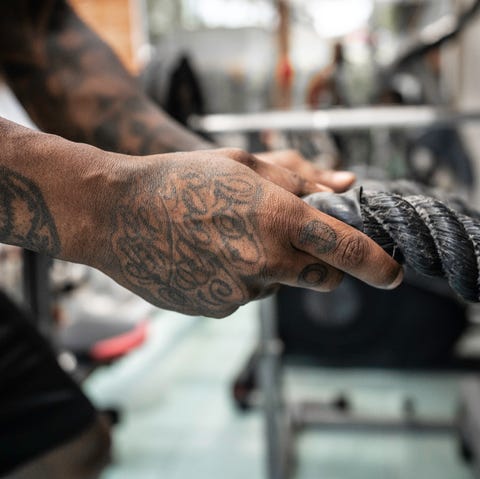
FG Trade
Is Black Skin Harder To Tattoo?
Another common myth about tattooing darker skin tones is that it's more difficult because the skin is thicker or tougher. Not true, says Michaels, and actually comes from artists who don't know "how to properly design tattoos for darker skin," In fact, he says, dark skin is often "softer" and while it can be tricky to see ink on especially dark skin during the tattooing process, it can also be "significantly less work and less demanding" on the artist. "The darker I am, the less ink I need for details to be visible," he says. He does note, however, that larger designs tend to be better to allow distance between the shadows and highlights (the dark ink and the skin) to make the piece pop.
Does Dark Skin Scar More Easily Than Light Skin?
While it is true that people with darker skin tones have more fibroblasts, a type of skin cell that promotes collagen production, that can make them more prone to scarring and, particularly in those of African descent, keloids (a type of overgrown scar), a propensity for scarring "doesn't seem to have anything to do with the pigment of the skin," says Alabama-based dermatologist and Men's Health advisor Corey Hartman, M.D. Instead keloids are mostly genetic, he says, and are caused by deep trauma to the skin. "You have to get into the deeper layer of the skin to create scar tissue in the first place," he says. "I've seen two patients who keloid reactions from tattoos, but I've seen many patients of color with tattoos over the years so that's a relatively low number."
If skin tone isn't necessarily a factor in scar and keloid production, then where does this myth come from? Likely from horror stories of people tattooing on darker skin that aren't used to it, says Foster. If an artist goes over the same area too many times or tries to pack in more color trying to get it brighter, the skin can become overworked, inflamed and can potentially scar more easily during the healing process. If that happens, it usually has more to do with the (incorrect) technique of the tattooer than the skin itself.
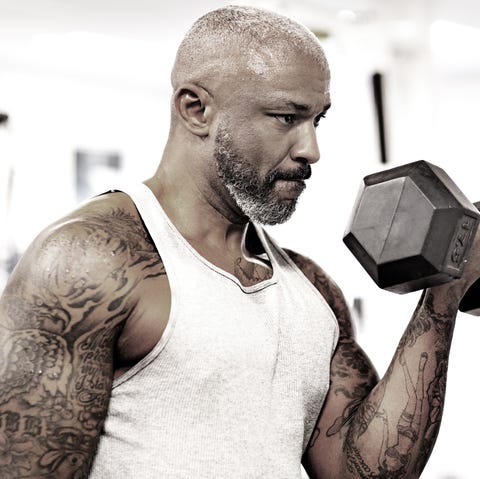
Lorado
How To Find The Best Tattoo Artist For You
So we've established that the common myths about tattooing on dark skin have more to do with the tattooer than the skin tone of the person getting the tattoo, but how do you find someone who can give you the best tattoo possible?
1. Do Your Research
Finding an artist whose work you like is the first step and these days, the best way to do that is over social media. Start with artists who do the style you want. "If you're getting a portrait, you want someone who is really good at doing portraits," says Foster. He also recommends looking for tattooers who have been working for a long time and have a robust portfolio of work, especially if you're worried about finding someone who is experienced with darker skin tones. Chances are, the longer they've been tattooing, the more experience they have with tattooing a variety of people and have been able to see how their work holds up over time. Look for pictures of their work on darker skin tones, but don't be discouraged if there aren't many. "It can be really challenging to take a good representative photo of a tattoo on darker skin," says Foster, and artists aren't inclined to post photos if they feel they don't do their work justice. If you find an artist you like, but don't see many shots of their work on darker skin, reach out to them to ask if they have any they haven't posted.
2. Look For Healed Photos
Most tattoo photos you see on social media are taken when the piece was fresh, but it's especially important for people with darker skin tones to look for healed photos of an artist's work, especially photos of healed pieces on dark skin. It will give you an idea of how the colors look over time and whether there was any scarring. "Scarring on dark skin will attract a lot of light and you can see a gloss or shine over a scarred area that was too deep," says Michaels. You can find healed photos of tattoos through hashtags, he advises, and if an artist you like doesn't have many on their feed, ask them for some before or during the consultation. Pay special attention to work on skin tones close to your own to get an idea of how the artist's work holds up.
3. Always Get A Consultation
Once you find an artist (or a few) whose work you like, ask for a consultation. "Meeting the artist is most important," says Foster, who always requires an in-person conversation before booking a tattoo. "We talk about your idea and feel each other out to see if it's a good fit. To me, a good fit personality-wise is always the most important thing." A consultation is the best time to not only get a vibe for the artist, but ask questions. And you should always ask a lot of questions, says Michaels. For instance, if they don't have many pictures of their work on dark skin, the consultation is the time to ask them about their experience. If they're not up front with you, or offer to show you more pictures of their work, they're not the artist for you.
4. Follow Your Instincts
Like any industry, there are plenty of tattoo artists who may tell you what you want to hear because they want your business, so always use your intuition. If an artist seems nervous or uncomfortable with what you're asking them to do, it's a red flag. It mostly boils down to experience, says Foster, who advises looking for someone with a lot of years under their belt and avoiding gimmicks like someone who says they only tattoo dark skin but might be newer to the game. What's most important is that "you're comfortable with an artist and they're comfortable tattooing you," he says.
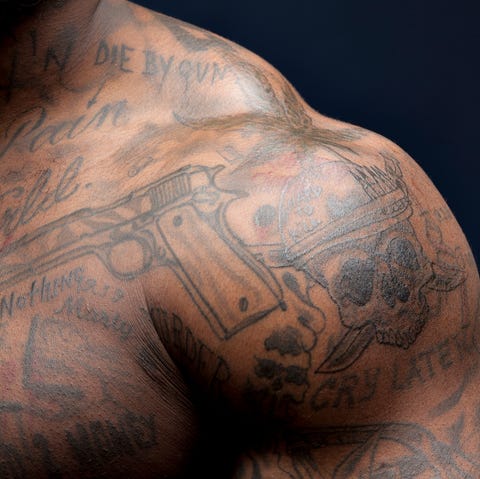
David Sacks
What To Do After The Tattoo
Your tattoo journey doesn't stop once you leave the shop. In fact, after care is just as important as who actually does your tattoo. Proper aftercare aids in the healing process and can help prevent scarring and keep tattoo ink looking fresh for years. The key to aftercare is "hydration and cleanliness," says Michaels, who also cautions that "less is more." He recommends avoiding heavy ointments which can be too occlusive and trap bacteria. Instead, use fragrance-free antibacterial soap to clean the fresh tattoo and moisturize it with an unscented lotion or a natural oil like jojoba. Foster recommends oils rich in vitamin E to enrich the skin and natural moisturizers, like shea butter and coconut oil (or a product that contains them like Hustle Butter). And keep using them once the tattoo has healed—moisturized skin makes tattoos look fresher and healthier "like putting wax on a car," he says.
The Best Tattoo Care Products:
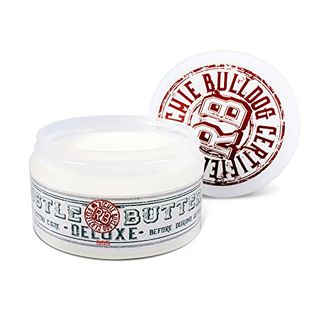
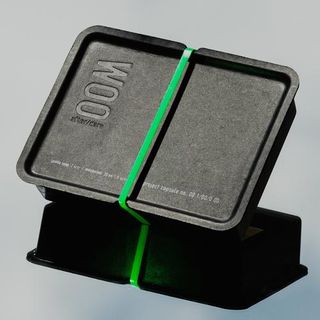
Project Woo After/ Care Treatment Kit
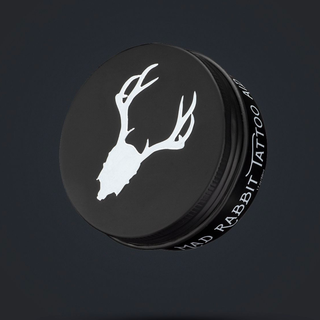
Mad Rabbit Tattoo Balm
madrabbittattoo.com
$15.99
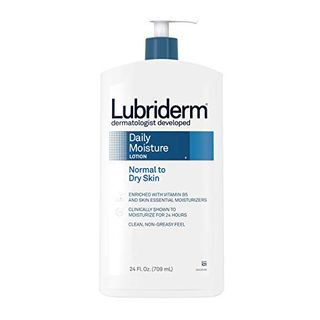
Lubriderm Daily Moisture Hydrating Body and Hand Lotion

Dial Antibacterial Bar Soap 8-Pack

Health Priority Natural Products Organic Vitamin E Oil
Garrett Munce Garrett Munce writes about men's style and grooming.
This content is created and maintained by a third party, and imported onto this page to help users provide their email addresses. You may be able to find more information about this and similar content at piano.io
Can Light Skinned People Get Color Tattoos
Source: https://www.menshealth.com/grooming/a35658654/tattoos-on-dark-skin/